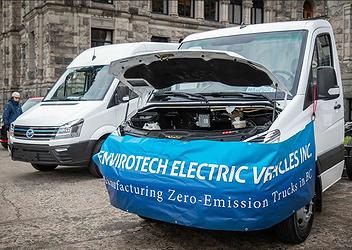
VICTORIA, British Columbia, Canada, June 1, 2019 (ENS) – In a move aimed at removing a major source of air pollution and climate change, the provincial government has put British Columbia on a path to require the sale of all new light-duty cars and trucks to be zero-emission vehicles by the year 2040. British Columbia Wednesday passed a law curbing the production and sale of gasoline-fueled cars in the province, marking North America’s most progressive clean vehicle legislation to date.
The law requires that 10 percent of all vehicles sold by 2025 be zero emission, while the sale of fossil fuel-burning cars and trucks will be banned outright by 2040.

The Zero-Emission Vehicles Act, ZEVA, sets a target of 10 percent of all new light-duty cars and trucks sold in British Columbia to be zero emission by 2025. Fifteen years later, by 2040, they all must be emission free.
Zero emission vehicles include battery electric, plug-in hybrid electric, and hydrogen fuel-cell models.
“If we want British Columbians to be part of the solution for reducing air pollution, we need to make clean energy vehicles more affordable, available and convenient,” said Premier John Horgan, said this initiative is the first major policy commitment of the government’s strategy to meet B.C.’s legislated climate goals.
“Everywhere I go, I hear from British Columbians who are excited to embrace electric vehicles,” said Andrew Weaver, leader of the B.C. Green caucus. “As an EV owner myself, I can attest to how good it feels to save fuel and repair costs, while doing my part to reduce emissions. The B.C. ZEV mandate is an exciting development that will support British Columbians as we make the shift to the low-carbon economy.”
Premier Horgan said he will work to expand the size of the province’s electric vehicle direct-current fast-charger network to 151 sites, with 71 already completed or underway and, leveraging federal and private-sector dollars.

The premier also promised to increase the provincial incentive program, administered by the New Car Dealers Association of BC, by C$20 million to encourage more British Columbians to buy clean energy cars now, bringing the incentive program up to $57 million in total.
But there are problems at the outset. For one thing, British Columbians can just go across the border to the neighboring province of Alberta and purchase gasoline-powered vehicles there.
For another, a recent study by Vancouver-based Clean Energy Canada found there aren’t enough electric vehicles in British Columbia to keep up with the demand. Eager buyers are waiting up to 18 months for their new cars to arrive, the study shows.
“Only 40 percent of dealerships had even just a single electric vehicle on the lot,” Clean Energy Canada Policy Director Dan Woynillowicz told the CBC.
This new law sets provincial targets for the sale and lease of light-duty zero-emission vehicles and sets out a plan for increasing the supply of zero-emission vehicles in British Columbia.
For automakers who cannot or do not want to produce zero emission vehicles, the law allows them to pay a little extra to save themselves the cost of developing the emission-free models.
There are also provisions in the law allowing quotas to be adjusted depending on the overall production of zero-emission vehicles over the next 20 years, in case a 2040 ban proves too difficult.
Still, ZEVA is a step forward for North America, which lags behind Europe in legislation regarding petrol-burning cars. Many European countries already have laws in place limiting the sale of gas-powered vehicles and incentivizing the purchase of electric and zero-emission cars and trucks.
In Norway, Europe’s leading electric market ahead of Germany, one out of every three cars purchased is an electric vehicle. The country is even installing the world’s first electric taxi charging system to help it achieve a zero emission country-wide taxicab fleet by 2023.
Norway aims to ban petrol-powered cars and trucks by 2025; France has set 2040 as its zero-emission vehicle date, and the UK is looking to 2050.
In the United States people bought more than 17 million new cars in 2018, with just 1.2 percent of them being electric, according to the International Energy Agency. No law setting limits on gasoline-powered vehicles has been passed.
Right now British Columbia, where six percent of all new cars sold now are zero emission vehicles, is the only area in North America to pass legislation setting a hard limit on petrol-powered vehicles.
Copyright Environment News Service (ENS) 2019. All rights reserved.
© 2019, Environment News Service. All rights reserved. Content may be quoted only with proper attribution and a direct link to the original article. Full reproduction is prohibited.
